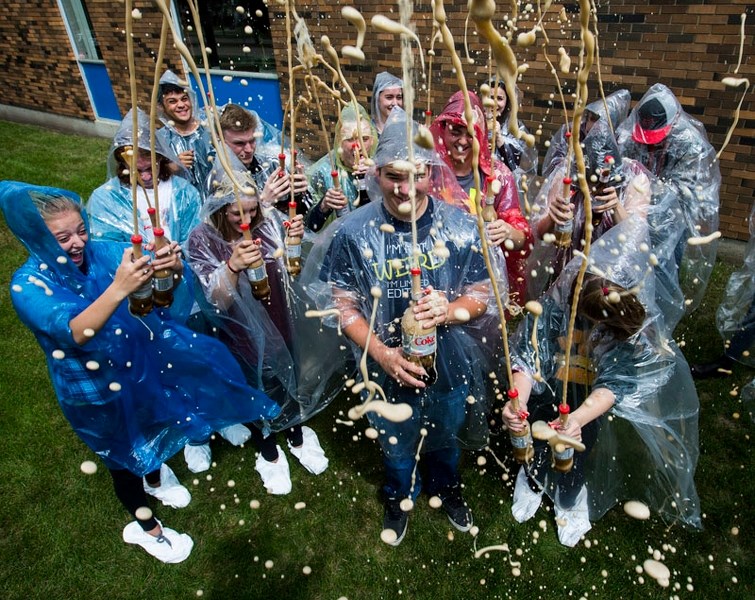Some Paul Kane summer school students became TV stars this week using the power of science.
About 10 Paul Kane summer school students joined chemistry teacher Michael Ng Wednesday morning to perform the famous Mentos-and-Coke fountain experiment live on television. The performance was part of Ng's ongoing monthly segment on Global News Morning where he demonstrates basic scientific principles.
Ng said this was the first time that he'd brought some of his students on the show. The students, who are part of the biggest summer school course he's ever taught, had to leave the school at 5:30 a.m. in time for the 6:40 a.m. broadcast.
Each of the students, plus Ng, summer school principal Randy Kozak and a few guests, had a two-litre bottle of Diet Coke and a stack of Mentos candy. On cue, they dropped the candy into the bottles and caused the soda within to shoot some 20 feet into the air.
The whole venture was almost derailed by a furious thunderstorm that morning.
"Everyone was worried," Ng said, but the rain eased off just in time for the demo.
"We really lucked out."
Ng said one of the bottles triggered early just seconds before they went to air, and that he had to hurl it to one side to avoid getting blasted in the face.
Student Sarah Zurowski said she had to shake her bottle to make it go off properly, which just goes to show how science doesn't always work the way you expect.
"It was fun getting out and having a field trip even though it's summer school," she said.
"It's making summer school way more fun than I thought it would be."
Crazy summer school
The experiment was one of the many unique activities happening this month at Paul Kane, which is hosting one of St. Albert's three high-school summer school programs.
About 590 grades 9-and-up students from across the region are enrolled at the Paul Kane summer school, Kozak said. Some are upgrading or retaking courses, but many are looking to get ahead on their next year of school.
"It's not for everyone," he said of summer school. It's a compressed schedule, with a typical 120-hour course squeezed into just 80.
"That's one week of classes in one day."
But it also lets students focus on one subject at a time, which makes it easier to remember what you learn, said Naomi Godsmark, who is in Ng's class.
"I'd rather have all my classes be like summer school."
This summer, students have been going on field trips to the University of Alberta, building sets for next year's production of The Little Mermaid, and going on a one-week trip to Japan, Kozak said.
"It was kind of a course on the road," he said of the latter, as students had to practice photography skills while in Japan. The trip itself was a holdover from a Japanese course held last semester.
Next week, students will be headed to the foothills for a week's worth of hiking, climbing, cycling, and canoeing – part of the popular 11-credit Camp HeLa course that packs phys-ed, career and life management, and three outdoor education courses into one two-week lump.
Students spend their mornings in summer school and have the afternoons off for work or play. Ng noted that some of the students in his Wednesday experiment had been up till 11 p.m. working the previous night.
Godsmark said summer school makes her feel more productive, and doesn't take away from the social aspect of summer – especially as many of her friends sleep until the afternoon in the summer anyway. Her brother isn't in summer school, and he's super-bored because of it.
"I think summer (break) here is too long," she said, suggesting that a shorter one like they have in Britain would be better.
"You forget the stuff you should be remembering (by fall)."
Summer school wraps up with finals and diploma exams in the next few weeks. After that, teachers have about two weeks off before they have to get ready for this fall, Kozak said.




